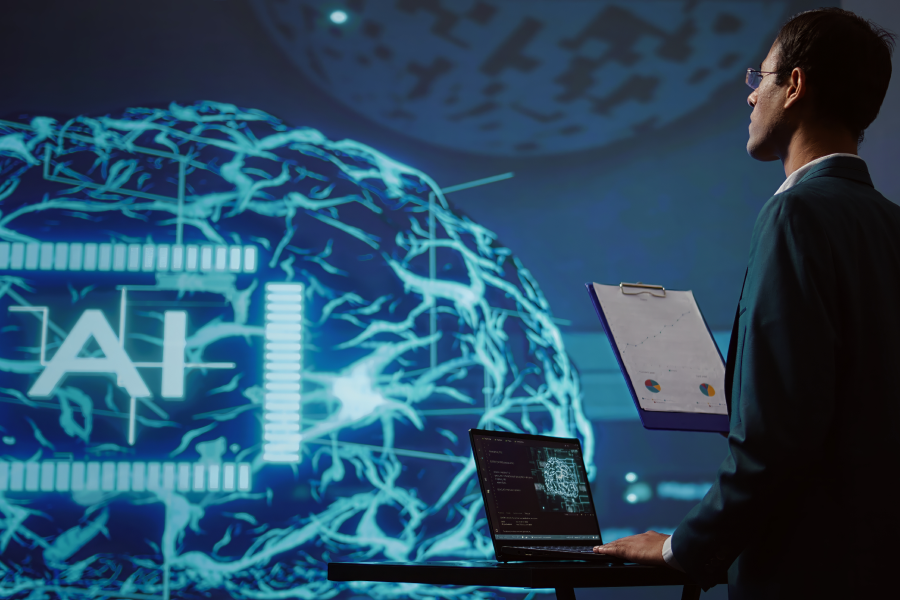Digitalization considerations have been made since time eternal in the medical field. However, its major application and adoption was seen since the onset of the COVID-19 pandemic. As the amount of data multiplied and the need of patients changed, the only possible solution emerged in the name of digital health.
In this spectrum, Machine Learning, Artificial Intelligence (AI) and Big Data have been viewed as potential solutions. Especially when considering Machine Learning, it has the means to cater to increased data flow, while managing cost and operations. In addition to these primary roles, Machine Learning is also capable of ensuring efficiency in detection and providing personalized care.
Here is a run through of what is machine learning, how it is helpful in the healthcare sector, and an expert’s insight into the ways in which ML can elevate a patient’s care plan. (If you are looking for Machine Learning Experts and Python Developers for Hire, look no further than Softgrid Computers)
What is Machine Learning?
Machine Learning falls under the category of Artificial Intelligence (AI). It is safe to say that it is the most useful form of AI, especially in a healthcare setting. Primarily, it is known to draw patterns in huge amounts of data. As an observable pattern is noticed, the decision-making process for physicians is facilitated.
ML operates on algorithms that are programmed for specific functions. These algorithms enable the handling and management of data independently, without the need for human intervention. With time, predication accuracy increases without the need for programming,
Machine Learning is prominently used in three different aspects for unveiling various trends-
· Representation: This refers to representing the data in a fashion that is comprehensible for the computer.
· Evaluation: Next in line is evaluating whether the represented data is useful or not.
· Optimization: Lastly, with optimization, the best model is chosen for accurate outputs.
How does Machine Learning Aid the Healthcare Ecosystem?
While machine learning has numerous applications in the medical setting, the most important role is seen in the following three areas-
1. Data Recording
The pivotal benefit of a Machine Learning system is recordkeeping, especially in terms of Electronic Health Records (EHRs). EHRs ensure reduction in administrative costs, better patient care, and add precision to operations. For instance, it helps in natural language processing, thereby recording medical notes without the need for manual entry.
It also supports the job of a physician by automating image analysis, assisting clinical decision making, and integrating useful technologies.
2. Data Usability
Healthcare data is primarily designed for EHRs and cannot be used in its raw form as it won’t deliver any concrete meaning. For maintaining data integrity, it is important to process it through algorithms that find a pattern and deliver meaning to a plethora of otherwise incomprehensible content.
3. Accurate Predictions
Predictive analytics function of Machine Learning makes it integral to the current healthcare ecosystem. The algorithms, when put to use, lead to chunks of information that can direct the patient care plan effectively.
How is Machine Learning Useful in Improving a Patient Care Plan: Insights from an Expert
Now that the usefulness of Machine Learning is well stated, it is vital to know how it can improve a patient care plan in a healthcare setting. A chief technology officer at a healthcare organization shared the following details in an interview-
· Enhancing Patient Care Plan Via Personalized Analytics
On being questioned about how a patient care plan can be enhanced through Machine Learning, It is clearly stated that evidence-based guidelines are an operating principle of the intelligence system, but they are written keeping in mind an average patient’s specifications. To accommodate any discrepancy, Machine Learning is used to infer the closest identical issue and course of path that it followed from real world historical data.
· Usefulness of ML in using Social Determinants of Health (SDOH) to provide Meaningful Care
When considering a typical Electronic Health Record (EHR), there are few chances to find reference to Social Determinants of Health (SDOH). Having said that, the best of physicians do consider this aspect diligently.
This is because it makes references to lifestyle patterns, living conditions, and so many more factors that can have a considerable impact on physical health.
Natural language processing, which falls under Machine Learning, is responsible for capturing such intrinsic details. Although not really comprehensive in nature, such pieces of information provide a wholesome approach.
· Machine Learning Acquiring a Crucial Position in Healthcare Setting
The biggest issue of the healthcare system is that data is presented in a messy format. This way it is not quite accessible and comprehensible. A structured data format can readily resolve this problem.
Big data is quite difficult to segregate on various parameters. ML aids the segregation of data on the account of various variables. This makes it easier to determine the crucial parameters of health that need immediate attention.
In Essence
Big data and analytics is a major issue that plagues the healthcare system. Now that the data inflow has only multiplied, it is important to use the convenient faculty of Machine Learning for proper management. Softgrid Computers is one such company that is surging quite high in terms of managing and recording humongous healthcare data and doing great efforts in patient record management software. The system they devise helps in capturing information, processing it efficiently, and providing in an easily comprehensible format. The data that they cater to includes hospital records, patient records, medical test results, and the like. This suggests that Machine Learning is quite integral in making the patient care plan even more effective.

 Web and Full Stack
Web and Full Stack CMS and Frameworks
CMS and Frameworks Online Marketing
Online Marketing Cloud Services
Cloud Services ECommerce
ECommerce Mobile
Mobile



